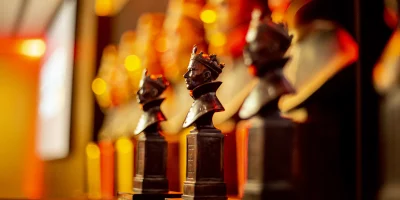
Michael Gambon – majestic, always moving, the theatre world looks smaller without him
The titanic stage and screen actor has passed away aged 82.
It’s not often that you see the star of a show applauding themselves. But that was the case at the National’s Cottesloe Theatre – now the Dorfman – one unforgettable night in 1987 during the curtain call of Alan Ayckbourn’s magnificent revival of Arthur Miller’s A View from the Bridge.
As its leading man, Michael Gambon, stepped forward to acknowledge an ovation for his performance as the Brooklyn longshoreman, Eddie Carbone, the actor put his hands together ever so briefly to clap himself.
It was a fleeting, spontaneous gesture, delivered with a touch of embarrassment, but it encapsulated what we’ve long known: “the great Gambon”, who died Wednesday age 82, genuinely deserved the adjective bestowed upon him by Ralph Richardson. Surely even someone as deeply modest as he was had the right, for a few seconds, to honour a seismic talent that lingers (and how) in the memory to this day.
Headlines have identified the Dublin-born Anglo-Irish actor chiefly as Albus Dumbledore, the Hogwarts professor whom Gambon played across the six later Harry Potter movies, stepping up to the part upon the death of the role’s originator, Richard Harris.

But for those of us lucky enough to have gone regularly to the London theatre from the mid-1980s onwards, Gambon was one of those talents whose occupancy of a stage was something very special indeed. I probably first saw him in 1983 in the National’s Olivier auditorium, leading the charge as one of the European men of letters who are expatriated to Los Angeles in Christopher Hampton’s bravura history play, Tales from Hollywood.
And it was the National that Gambon made his unofficial home, notwithstanding a series of Royal Shakespeare Company successes – prior to my arrival in Britain – that included Lear to Antony Sher’s Fool and Antony to Helen Mirren’s Cleopatra.
It became a real joy to watch Gambon take effortless command of all three National spaces, not least as a defining member of Ayckbourn’s onetime company that included the revelatory Miller revival and a blistering Ayckbourn premiere, A Small Family Business. That Thatcherite critique starred Gambon as a decent family man undone by an all-encompassing duplicity.
Ayckbourn was something of a mainstay for Gambon, who was among the starry 1970s cast of The Norman Conquests and then led, with Peter Bowles, the blistering 1990 West End premiere of Man of the Moment – another morality tale, this one requiring a swimming pool onstage.
The feral rage he uncorked as Eddie Carbone was something to behold, and he similarly cowed a rapt audience as the Sergeant in Harold Pinter’s one-act Mountain Language, Gambon’s embrace of new writing as well as the classics a constant throughout his career.

I vividly recollect the mixture of the tetchy and the deeply tender that he brought to the entrepreneurial Tom Sergeant in David Hare’s much-admired Skylight, which brought Gambon across the Atlantic for his sole Broadway credit (opposite the invaluable Lia Williams) in 1996, its two leads receiving Tony nominations for their work.
He and Daniel Craig all but seared the Royal Court stage in the 2002 premiere there of Caryl Churchill’s much-revived A Number, with Gambon as the querulous father of a genetically cloned son. Capable of an instant authority, due not least to his decisive roar of a voice, Gambon was equally able to retreat inwards, letting his famously long fingers communicate reserves of feeling otherwise left unexpressed. (He could do impersonations with those fingers, as he once explained to the New York Times drama critic Mel Gussow.)
He had a penchant for the outsized, too, as if unable to rein in an effortless gift that may have surprised even himself. I recall his broad, barnstorming Volpone, opposite Simon Russell Beale’s Mosca, at the National in 1995, a contrasting gift for modulation everywhere evident in a new play from that show’s same director, Matthew Warchus: Yasmina Reza’s delicate 1998 two hander, The Unexpected Man, which travelled on to New York but with Alan Bates inheriting Gambon’s role.
Later, again at the National but this time as Falstaff, Gambon was said by some to be mumbling, which was subsequently thought to be due to memory issues that came to the fore in later life.

Onscreen, I first became aware of him as the eponymous criminal in Peter Greenaway’s starry (and, at the time, X-rated in the US) film The Cook, The Thief, His Wife, and Her Lover, and I remain perplexed that his incisive supporting turn in the 1999 Michael Mann film The Insider didn’t net him an Oscar nomination.
On the other hand, three Oliviers and four television BAFTAs were doubtless enough for an actor who never sought the spotlight, and whose off-colour Evening Standard Theatre Award acceptance speech for View from the Bridge remains one for the ages.
Nor can one forget his psoriasis-plagued Philip Marlow on TV in the Dennis Potter series The Singing Detective, in which Gambon’s gifts for comedy, vulnerability and a kind of inner majesty seemed somehow to miraculously conjoin.
I last saw Gambon in-person standing alone by the doors of the National prior to Peter Hall’s memorial service in the very building to which both men so tirelessly offered up their talent. No one seemed to be noticing him that day, and he seemed entirely fine with that. The show, not the showman, was always Gambon’s thing, and the theatre world looks that much smaller without him.
Michael Gambon: 19 October 1940 – 27 September 2023
Photo credits: Murdo Macleod, Thompson Theatre Collection, Joan Marcus, Catherine Ashmore
Originally published on









